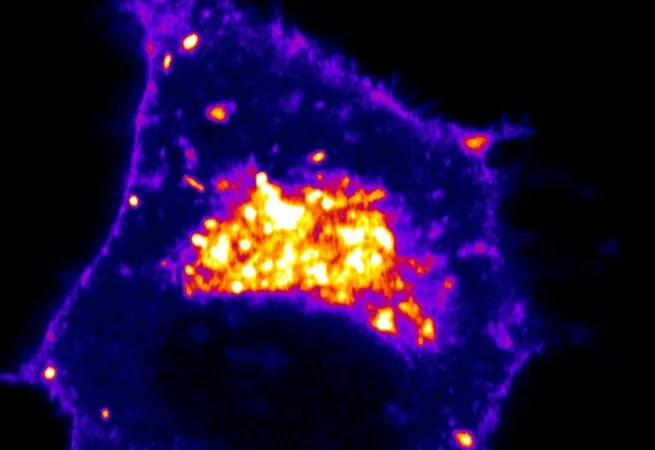
Revolutionary Discovery: Inceptor Protein Could Transform Diabetes Treatment!
2024-11-25
Author: Jia
Revolutionary Discovery: Inceptor Protein Could Transform Diabetes Treatment!
In a groundbreaking revelation, researchers have uncovered the dual role of the inceptor protein in regulating insulin levels in beta cells. Initially identified three years ago as a natural inhibitor of the insulin signaling pathway, inceptor was recognized for its ability to diminish insulin sensitivity by blocking insulin receptor and insulin-like growth factor 1 receptor signaling. A pivotal study published in 2021 in Nature titled “Inceptor counteracts insulin signaling in β-cells to control glycaemia” provided a comprehensive understanding of how inceptor functions as a negative regulator.
The latest research published in Nature Metabolism has taken this understanding further, demonstrating that inceptor binds excess insulin within beta cells and directs it toward degradation. Dr. Heiko Lickert, a prominent figure in diabetes research at Helmholtz Munich and the Technical University of Munich (TUM), commented, "This knowledge about Inceptor’s function gives us a deeper understanding of how beta cells regulate their insulin homeostasis."
The findings are particularly promising for diabetes management. As high insulin levels can often lead to complications in insulin secretion, a clearer understanding of inceptor's role may help researchers explore new methods for restoring proper insulin balance. The inceptor is encoded by the gene IIR/ELAPOR1 and plays diverse roles in lysosomal degradation, autophagy, zymogenic granule maturation, and acrosome formation.
Excitingly, researchers found that blocking or inhibiting inceptor can significantly replenish insulin stores in beta cells, boost insulin release, and prevent cell death. “Especially in already damaged cells, blocking Inceptor could help boost insulin production and protect the beta cells,” Dr. Lickert elaborated. This discovery presents a potential strategy for enhancing the survival and function of insulin-producing cells in individuals suffering from diabetes.
In experiments using human induced pluripotent stem cell-derived islets, scientists observed that knocking out the IIR gene improved beta cell differentiation and survival rates dramatically. Enhanced insulin content and glucose-stimulated insulin secretion (GSIS) were also significant outcomes of this approach.
Moreover, the localization of inceptor in clathrin-coated vesicles and secretory granules indicates its critical role as a sorting receptor, directing proinsulin and insulin toward lysosomal degradation. This mechanism opens doors to targeting inceptor for more effective diabetes therapies.
Dr. Lickert's team aims to develop medications designed to block inceptor, thereby supporting insulin balance and prolonging beta cell viability. These innovative drugs could be particularly effective for individuals in the early stages of type 2 diabetes, potentially slowing disease progression and reducing the risk of severe complications.
To accelerate these findings into practical treatments, Dr. Lickert has launched a startup focused on developing these inceptor-blocking drugs. Preclinical studies are the next step to assess the safety and efficacy of these therapies. "Our goal is to pave the way for clinical trials and contribute to the treatment, and hopefully even the cure, of diabetes," he stated optimistically.
With the promise of a new therapeutic horizon on the horizon, this research might significantly alter the landscape of diabetes management, offering hope to millions affected by this chronic disease. Could this be the breakthrough diabetes patients have been waiting for? Stay tuned!



 Brasil (PT)
Brasil (PT)
 Canada (EN)
Canada (EN)
 Chile (ES)
Chile (ES)
 España (ES)
España (ES)
 France (FR)
France (FR)
 Hong Kong (EN)
Hong Kong (EN)
 Italia (IT)
Italia (IT)
 日本 (JA)
日本 (JA)
 Magyarország (HU)
Magyarország (HU)
 Norge (NO)
Norge (NO)
 Polska (PL)
Polska (PL)
 Schweiz (DE)
Schweiz (DE)
 Singapore (EN)
Singapore (EN)
 Sverige (SV)
Sverige (SV)
 Suomi (FI)
Suomi (FI)
 Türkiye (TR)
Türkiye (TR)